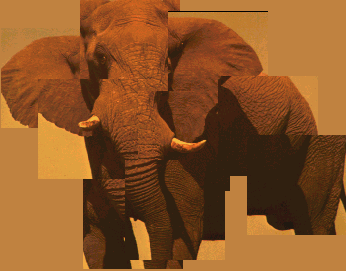
Please do not adjust your set!
A number of disciples went to the Buddha and said, "Sir, there are living here in Savatthi many wandering hermits and scholars who indulge in constant dispute, some saying that the world is infinite and eternal and others that it is finite and not eternal, some saying that the soul dies with the body and others that it lives on forever, and so forth. What, Sir, would you say concerning them?"
The Buddha answered, "Once upon a time there was a certain raja who called to his servant and said, 'Come, good fellow, go and gather together in one place all the men of Savatthi who were born blind... and show them an elephant.' 'Very good, sire,' replied the servant, and he did as he was told. He said to the blind men assembled there, 'Here is an elephant,' and to one man he presented the head of the elephant, to another its ears, to another a tusk, to another the trunk, the foot, back, tail, and tuft of the tail, saying to each one that that was the elephant.
"When the blind men had felt the elephant, the raja went to each of them and said to each, 'Well, blind man, have you seen the elephant? Tell me, what sort of thing is an elephant?'
"Thereupon the men who were presented with the head answered, 'Sire, an elephant is like a pot.' And the men who had observed the ear replied, 'An elephant is like a winnowing basket.' Those who had been presented with a tusk said it was a ploughshare. Those who knew only the trunk said it was a plough; others said the body was a grainery; the foot, a pillar; the back, a mortar; the tail, a pestle, the tuft of the tail, a brush.
"Then they began to quarrel, shouting, 'Yes it is!' 'No, it is not!' 'An elephant is not that!' 'Yes, it's like that!' and so on, till they came to blows over the matter.
"Brethren, the raja was delighted with the scene.
"Just so are these preachers and scholars holding various views blind and unseeing.... In their ignorance they are by nature quarrelsome, wrangling, and disputatious, each maintaining reality is thus and thus."
Then the Exalted One rendered this meaning by uttering this verse of uplift,